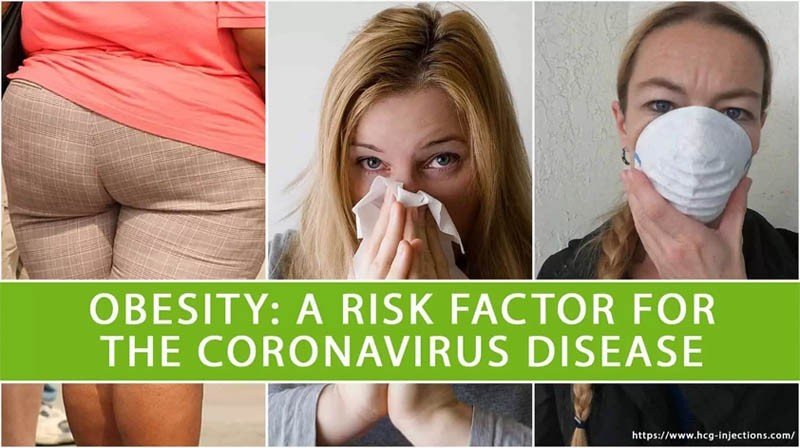Obesity: A Risk Factor for the Coronavirus Disease?

Obesity makes COVID-19 worse. No one knows why but hypotheses abound. Based on current information, being overweight is a risk factor for becoming seriously ill with the SARS-CoV-2, the virus that causes COVID-19. COVID-19 has been hitting obese patients really hard and it’s a very alarming finding in the US, which has one of the highest obesity rates in the world.
Aside from older adults with underlying medical conditions, young, obese adults also appear to be particularly at higher risk from becoming seriously ill with this disease. New research suggests obesity independently is a strong predictor of severe illness particularly for young adults. Studies in China revealed that overweight and obesity were almost five times more prevalent in COVID-19 patients who died than those who survived. Some hospitalized obese patients may have already compromised respiratory function after the infection.
What you need to know about obesity and COVID-19?
Obesity is medically defined as having a body mass index or BMI of 30 or higher. Being obese makes you more likely to have health issues like:
- High blood pressure
- Diabetes
- Stroke
- Heart disease
- Breathing problems
- Asthma
- Osteoarthritis
- Kidney disease
- Fatty liver disease
- Certain types of cancer
Although not all obese has these problems, these obesity-related conditions seemingly worsen the effects of the coronavirus disease. Obese patients with underlying conditions like diabetes and heart disease are at higher risk of complications from the coronavirus disease.
Obesity and severity of COVID-19
Excess fat deposition can be risky. SARS-CoV-2 has a higher affinity to human angiotensin-converting enzyme 2 (ACE2), particularly among obese patients. ACE2 are enzymes attached to the outer surface of the cells in the heart, lungs, arteries, kidney, and intestines. The ACE2 enzyme of obese binds well to the coronavirus which increases the severity of the disease.
Patients with higher BMI are more likely to be ventilated because their oxygen level is already low. They are predisposed to pulmonary dysfunction, and they have decreased chest function due to the weight on their chest.
Challenges in caring for obese COVID patients
Obesity is known to cause low-grade, chronic inflammation, and an increase in circulating, pro-inflammatory cytokines. This plays a role in the worsening of the condition. Furthermore, it presents challenges in patient management as it is more difficult for doctors to provide respiratory support for seriously ill obese patients. It’s even more challenging to obtain diagnostic imaging such as X-rays and CT scans due to the weight limit on imaging machines. Obese patients are also more difficult to position and transport by nursing staff.
How to stay safe from the virus if you are obese?
The best way for you to be safe from being infected from the virus is through dieting. There are tons of diet programs out there- from intermittent fasting, keto-diets, low-fat diet to low-carb diet and many others to mention. Some of which produces rapid weight loss but it’s either too expensive, too “gimmicky” or requires you to be physically active which you couldn’t do in this time of the pandemic.
The HCG Diet, unlike other diet programs, is not expensive nor gimmicky. It does not require you to be physically active just to shed pounds. Yet in this diet, it’s possible for you to lose 5 or more pounds each week in a safer way. The HCG diet combines a calorie restriction with a daily shot of HCG, a hormone produced by pregnant women. Here, you are only allowed to eat 500 calories a day for a certain number of days without getting hungry. All because of the HCG hormone that resets your metabolism so you’ll use your abnormal fats as a source of fuel.
HCG Diet for obese
COVID-19 pandemic presents a new set of challenges particularly for obese people in maintaining a healthy diet. However, it is still possible for overweight and obese people to reverse their condition while on quarantine simply by changing their diet plan. The HCG diet is a safe diet program that offers a clear and organized meal plan. Below are some benefits that you can get out from using the HCG Diet:
- Healthy weight reduction
With the HCG Diet, you’ll be able to burn excess fats on unwanted parts of your body. You’ll shed fats from your waist, arms, neck, and thigh, avoiding an unbalanced reduction.
- Improved metabolic function
You’ll experience an improved metabolic function because your body will use the extra fat reserves as a source of energy. Unlike with most dieting programs, once you start cutting back on calories, your hunger increases. So, your body thinks that you are starving and will start to store extra calories instead of burning them.
- No hunger pains
Cutting back on calories results in hunger and cravings but this is not the case with the HCG Diet. The HCG hormone will work wonders in your body by tapping on the calories from your stored fat so you don’t feel hungry.
- Lowers your cholesterol level
The hormone along with the very low-calorie diet help reduces your blood cholesterol level. You’ll develop a healthy eating habit which will also decrease your odds of getting a heart-related disease.
- Preserved muscle integrity
When you are trying to lose weight, your body will tap into whatever resources it can for fuel. That includes your muscles. Again, this is not the case with the HCG diet. The HCG Diet allows you to lose weight faster without compromising your muscle mass. The boost that you can get from the hormone places your body in anabolic mode making it easier for you to lose weight while building muscle mass.

